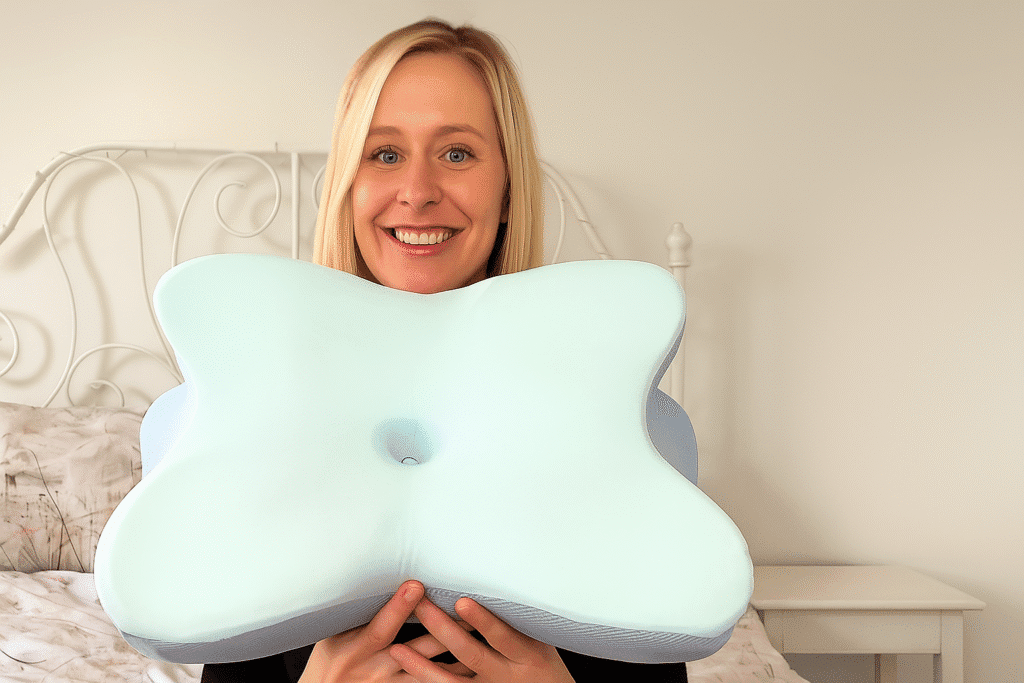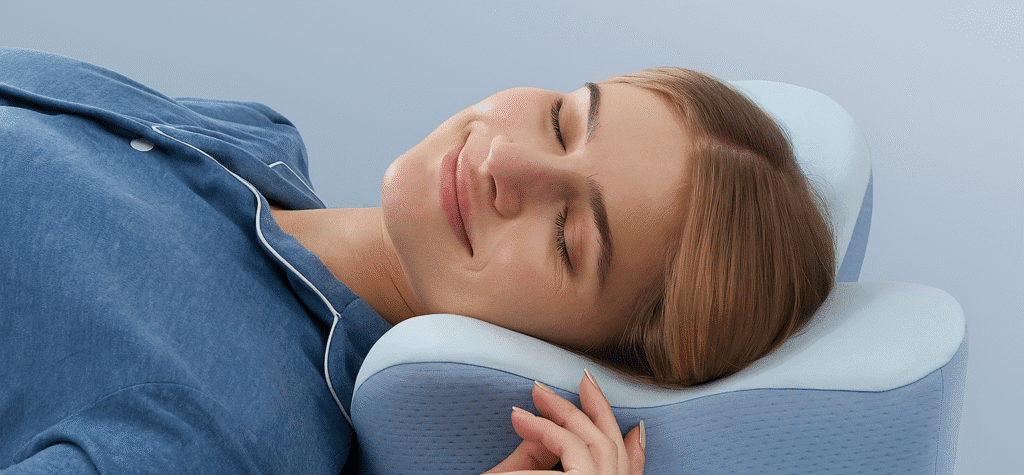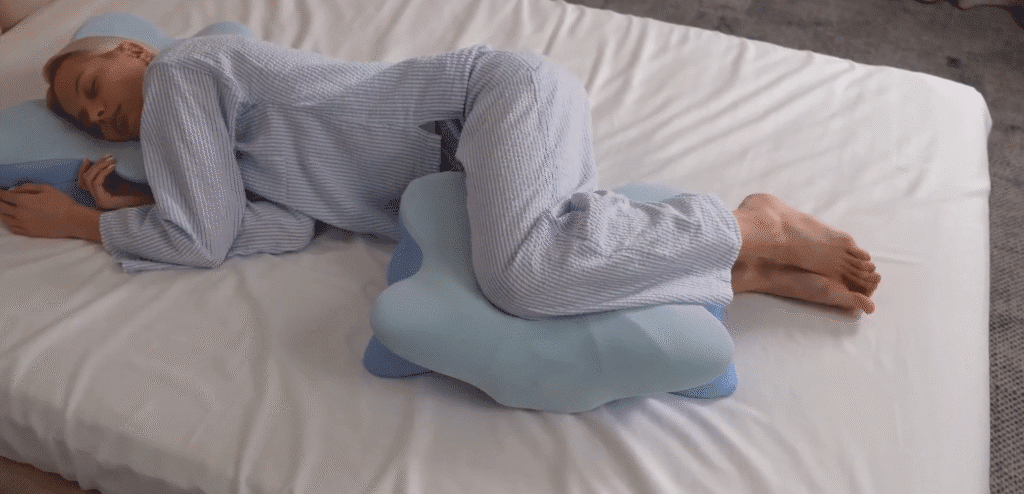Derila Memory Foam Pillow Review: Does it End Neck Pain & Snoring? (2026 Update)
Many people turn to ergonomic pillows like the Derila after spending too many nights tossing and turning on flat, unsupportive pillows that leave them waking up stiff, sore, or unrested.
The Derila Ergo Memory Foam Pillow features a unique butterfly design that encourages proper neck alignment, improves sleep comfort, and support better breathing posture—which may help reduce snoring for some sleepers,
But can one pillow really change how well you sleep? My in-depth review breaks down the features of this ergonomic design and takes a look at what real users are saying—here’s what to know before you buy.

Disclosure: This blog is reader-supported and contains affiliate links.
| Best For | Back & side sleepers with neck/shoulder pain |
|---|---|
| Material | High-density memory foam with advanced cooling technology |
| Design | Butterfly contour for spinal alignment |
| Reported Benefits | Less neck and shoulder tension, reduced snoring, deeper sleep |
| Downsides | Not ideal for stomach sleepers; not adjustable |
| Current Deal | Up to 70% off — View Deal |
What Is the Derila Ergo Memory Foam Pillow?
The Derila Ergo Memory Foam Pillow is an ergonomic pillow designed to improve sleep posture and ease tension caused by poor neck and spine alignment.
With its unique butterfly shape and contoured high density memory foam, it’s built to keep your spine aligned while you sleep—especially if you’re a side or back sleeper.
Each curve and dip of its butterfly shape is made with purpose: to cradle your head, support your neck, and ease pressure off your shoulders. That means less waking up with a stiff neck, sore shoulders, or that annoying pins-and-needles feeling in your arms.

This popular cervical support pillow is also able to respond to your body heat and weight, gently molding to the shape of your head and neck without excessive sinking—while built-in cooling channels help prevent heat buildup.
Unlike cheaper pillows that can go flat after a few months of use, this high-density foam stays firm enough to provide real support—without causing pressure points.
If you’re tired of stiff mornings, the Derila’s ergonomic design might be exactly what your sleep routine needs – you can pick up your Derila Ergo Pillow here at 70% off.
Derila Ergo Pillow Features: What Makes This Contour Design Different

Waking up with a sore neck, tension headaches or tight shoulders? It could be that your pillow is simply not doing its job. Here’s how the Derila Ergo Memory Foam Pillow targets these common sleep problems:
- Head Cradling: A gentle central depression supports your head, keeping it comfortably in place throughout the night.
- Neck Alignment: Raised side panels follow the natural curve of your neck, helping to maintain proper spinal alignment whether you sleep on your back or side.
- Targeted Support Zones: The ergonomic design creates specific zones for your head, neck, and shoulders—unlike flat memory foam pillows that apply uniform pressure.
- Shoulder Relief for Side Sleepers: Shoulder cutouts reduce compression, allowing your arm to rest naturally and preventing that tingling pins-and-needles sensation.
Because the shape adapts to your body instead of forcing your body to adapt to the pillow, it offers consistent ergonomic support through the night—even if you shift between back and side positions.
How to Use the Derila Pillow: Setup Guide for Proper Neck Support

Getting the most from your Derila Ergo Pillow requires understanding proper positioning. Derila’s butterfly design only works when your body is correctly aligned with the pillow’s ergonomic contours.
For Side Sleepers:
Position your head in the central depression with your neck resting on the curved support section.
Your shoulder should nestle into the lower recess, allowing your arm to rest comfortably without being trapped under the pillow. The contours should align with your neck’s natural curve.
For Back Sleepers:
Center your head in the designed depression with your neck supported by the curved sections.
The pillow should fill the space between your neck and the mattress without pushing your head too far forward. Your shoulders should rest on the mattress, not on the pillow.
Adjustment period: It can take 3 to 7 nights for your body to fully adjust to the Derila Pillow. If you’ve been sleeping with poor support for years, your neck muscles may need time to realign. Some initial stiffness is normal—it’s simply your body adapting to a healthier position.
Does the Derila Pillow Help with Sleep Apnea and Snoring?
What a lot of people don’t realize is that snoring and sleep apnea can happen due to poor head and neck positioning. When your head tilts back too far or your neck bends forwards, the soft tissues in your throat can partially block airflow, causing that distinctive rattling sound.
The Derila’s contoured design promotes optimal airway alignment by keeping your head in a neutral position. This positioning can help prevent the backward tilting that allows the tongue and soft palate to obstruct breathing passages.

The gentle elevation can also promote better drainage and reduce the chance of waking up feeling congested—especially for those who find flat pillows make things worse.
That said, it’s not a medical device and won’t treat diagnosed sleep apnea. If you’re currently using a CPAP or other prescribed therapy, be sure to speak with your doctor before making any changes.
But for light snorers or those who suspect their pillow might be part of the problem, using the right alignment-focused design consistently could make a noticeable difference in how restful the night feels.
👉 Check Latest Price & Availability Here — Up to 70% Off Today
What Customers Are Saying About the Derila Pillow
Pros:
✅ Less Neck and Shoulder Pain: Many users say they finally wake up without neck stiffness, sore shoulders, or that “knot in the neck” feeling. Some say their chiropractors noticed better posture after switching.
✅ Great for Combination Sleepers: Back, side, and combo sleepers report deeper sleep with less tossing and turning thanks to the pillow’s adaptive support.
✅ Real Improvements in Snoring and Breathing: A number of users, including frustrated spouses, say the Derila helped reduce snoring. While it’s not a medical device, many believe the improved alignment keeps airways clearer.
✅ Cooling Comfort for Hot Sleepers: Unlike standard memory foam pillows that trap heat, the Derila features a breathable design and built-in cooling technology that helps regulate temperature. Air flows more freely, so you’re not waking up in a sweat or flipping the pillow in the middle of the night. If you’re a hot sleeper, this is a huge win.
✅ Worth the Price for the Sleep Upgrade: Even initially skeptical buyers say the pillow lived up to the hype—and was worth the price for better sleep. Some even bought extras for guests or family.
Cons:
- Some Find It Too Firm at First: The Derila can feel firmer than expected during the first couple of nights. This is often part of the adjustment period, especially if you’re switching from an extra-plush or flat pillow. I highly recommend giving it 5–7 nights to let your body adjust to the new alignment. What feels “too firm” at first might be what your spine actually needs.
- Not Ideal for Stomach Sleepers: While side and back sleepers generally love the design, stomach sleepers may find the height and contour less comfortable due to the elevation. This isn’t unique to Derila—most ergonomic pillows don’t cater well to stomach sleeping.
- Not Adjustable: Unlike some pillows that let you add or remove fill, the Derila comes in a fixed shape and height. If you prefer customizing your pillow’s loft or firmness, this might not be the best fit.
Where to Buy the Derila Pillow: Official Store vs. Third-Party Sellers
The Derila pillow is available through the official website, where you’ll find the current pricing and any available discounts.
While you might find it on other platforms, buying direct ensures you’re getting the authentic product with full warranty coverage.
Final Thoughts: Is the Derila Ergo Pillow Worth It?

If you’ve been waking up with neck pain, feeling unrested despite a full night’s sleep, or constantly adjusting your pillow to get comfortable then it might be time for a change. A good pillow should support you—not leave you aching or restless.
The Derila Ergo Pillow offers a well-thought-out design that supports proper alignment and relieves pressure where it matters most. It’s especially well-suited for side and back sleepers who need more structure and targeted support than a standard pillow can provide..
It may not be ideal if you prefer ultra-plush pillows or sleep on your stomach, but for those dealing with chronic neck tension, shoulder pressure, or poor sleep posture, Derila could be the upgrade that finally makes a difference.
Frequently Asked Questions
Are Derila pillows any good?
Derila pillows receive generally positive reviews for neck pain relief and improved sleep quality. Users find that the contoured design helps support proper spinal alignment with responsive memory foam that is able to adapt to different sleeping positions. Most users report an adjustment period of about a week before experiencing the full benefits.
How do I clean the Derila Ergo Pillow?
The Derila Ergo pillow is easy to care for. Just spot-clean the memory foam core (which is naturally resistant to dust mites) and machine-wash the removable cover at 30°C (86°F). The durable fabric blend is more resistant to stains and grease than ordinary fabrics and dries fairly quickly, keeping your pillow fresh with minimal effort. Note that the inner pillow should not be machine-washed.
What type of pillow is best to stop snoring?
Contoured pillows with proper head elevation and neck support typically work best for snoring reduction. Look for ergonomic designs with memory foam that maintain consistent airway alignment.
Pillows with a depression for the head and support for the neck can help minimize airway obstruction. Individual anatomy varies, so finding the right height and firmness for your specific needs is important.
Does Derila pillow help with snoring?
The Derila pillow may help reduce snoring by supporting the head and neck in a position that keeps the airways more open. Its ergonomic design encourages better sleep posture, which can lessen snoring for some people, especially when it is posture-related.
What are the benefits of Derila pillows?
Derila pillows may help reduce neck and shoulder pain through proper spinal alignment. They adapt to different sleeping positions, potentially improving sleep quality and reducing snoring for some users.
The durable memory foam construction maintains support longer than traditional pillows, while the contoured design addresses specific sleep issues that flat pillows often miss.
What are the cons of Derila Pillow?
Common considerations to keep in mind is that the initial firmness may require a brief adjustment period; and potential challenges for exclusive stomach sleepers. It’s also important to note that the Derila is not an adjustable pillow.
Does an anti-snore pillow really work?
Anti-snore pillows can help reduce snoring for many users, particularly when snoring stems from poor sleep positioning. By supporting better spinal alignment, these pillows may address a common cause of airway obstruction.
Results vary depending on the underlying snoring cause. Positional snoring typically shows the most improvement with ergonomic pillows, while other types might require additional treatments.
Will elevating your head with 2 pillows reduce snoring?
Simply stacking two regular pillows often creates an awkward angle that might temporarily reduce snoring but can cause neck strain. The inconsistent support can create new problems while attempting to solve others.
A single properly designed ergonomic pillow typically provides more consistent support. The contoured design maintains appropriate positioning throughout the night without creating pressure points or alignment issues.
Are cervical memory foam pillows good?
Cervical memory foam pillows can provide excellent support for people with neck pain or poor sleep posture. They maintain the natural curve of your neck while sleeping, potentially reducing strain and promoting better spinal alignment.
These pillows typically offer more consistent support than traditional options, though they do require an adjustment period. Their effectiveness varies based on individual sleep habits and preferences.
What is the best pillow for cervical neck pain?
The best pillow for cervical neck pain features a contoured design that supports the natural curve of your neck. Look for medium-firm memory foam pillows with a depression for your head and elevated support for your neck.
Can you sleep on your side with a Derila pillow?
Yes, you can sleep on your side with a Derila pillow. Its contoured design helps fill the gap between your ear and shoulder, keeping your spine aligned horizontally and reducing potential neck strain.
The memory foam adapts to this position while providing consistent support throughout the night. Many side sleepers report improved comfort and fewer neck issues after adjusting to the pillow.
Will this help with shoulder numbness or arm pain from side sleeping?
The Derila pillow may help relieve shoulder and arm discomfort for side sleepers by minimizing pressure and supporting better alignment. Its contoured shape and shoulder cutouts can reduce nerve compression and the “pins and needles” feeling some users experience. If symptoms persist always consult a healthcare provider.
Is the Derila adjustable like some shredded foam or latex pillows?
No, the Derila is not adjustable. It has a fixed contoured shape. If you need to customize height or firmness, a shredded memory foam or latex pillow might suit you better.
Does the Derila sleep hot like other memory foam pillows?
The Derila includes built-in cooling features and breathable materials to reduce heat buildup, which many hot sleepers appreciate. However, individual experiences vary, and extremely hot sleepers might still find traditional memory foam warmer than desired – cooling pillowcases can help in this instance.
Is this pillow firm or soft?
The Derila has a medium-firm feel. It’s designed to maintain support without being overly stiff. Some users find it firm at first but say it softens slightly with use.
Will this replace my need to see a chiropractor?
While Derila may reduce some neck and posture-related discomfort, it is not a substitute for medical care. If you’re experiencing persistent pain, consult a healthcare provider.
Related Reading
- Best Pillow for Neck and Shoulder Pain
- Best Orthopedic Pillow for Neck Pain
- Best Pillows for Upper Back Pain
- Pelvic Pillows for Stomach Sleepers
- Cooling Bamboo Pillows
- How to Choose the Best Pillow for Front Sleepers
Disclaimer: This content is for informational purposes only and does not constitute medical advice. Always consult with a healthcare professional before making changes to your sleep setup or treating any health conditions. Individual results may vary.
